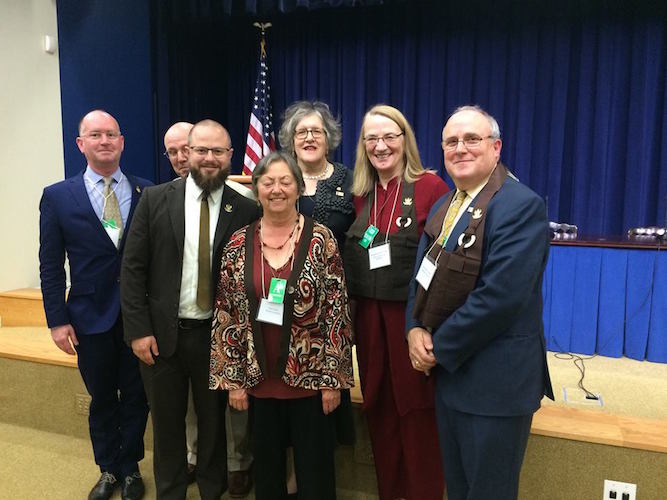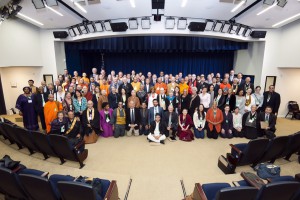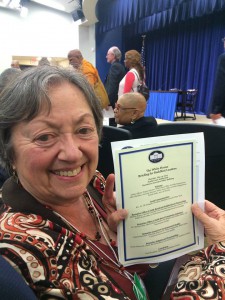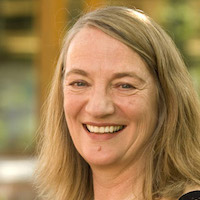The following piece originally appeared on the Shambhala Times, our partners in creating enlightened society. Stay tuned for more hosted articles by our friends at the Shambhala Times!
A Shambhala delegation attended the historic Buddhist Leaders’ Summit at the White House on Thursday, May 14th.
One hundred twenty-five leaders and teachers from 63 different Buddhist communities and organizations were invited to present the Buddhist Climate Change and Racial Justice Statements to senior advisors of President Obama’s team in a first-ever Buddhist lobbying group.
In attendance from Shambhala were Acharyas Marty Janowitz, Adam Lobel, and Judith Simmer-Brown; Naropa Environmental Studies professor Sherry Ellms; GreenFaith Board member Irene Woodard; New York Shambhala Center Director Timothy Quigley; and President Emeritus Richard Reoch.
The Summit was the first organized intersangha Buddhist lobbying group to visit the White House, representing a historic moment in the development of American Buddhism. The event was planned by the only full-time Buddhist lobbyist in Washington, Soka Gakkai International’s William Aiken, with a planning committee drawn from a number of American Buddhist communities.
Aiken began plans for a Buddhist teachers’ summit in 2001, shortly after the inauguration of George W. Bush’s faith-based initiatives programs. However, those plans were scuttled shortly after the 9-11 disaster, as the White House focused on Muslim relations especially.
In the years since, Aiken has waited for a new opportunity for such a gathering, and found it with the appointment of his friend Melissa Rogers as Special Assistant to the President and Executive Director of the White House Office of Faith-Based and Neighborhood Initiatives. With Rogers’ support, Aiken began plans for the Summit. Invitations were distributed through his network, and yielded what Jack Kornfeld called “the most diverse American Buddhist gathering in memory.” Representatives included monks and nuns from both ethnic and convert communities, lay priests, teachers and ministers from the usual vipassana, Zen, and Tibetan lineages, as well as Pure Land representatives from Nichiren, Soka Gakkai and Shin Buddhist lineages.
The morning was sponsored by George Washington University and focused on the efforts of various Buddhist-based initiatives and organizations lobbying for a concerted response to climate change and global warming. Bhikkhu Bodhi, prolific translator and founder of Buddhist Global Relief, presented a profoundly moving detailed analysis of the Four Noble Truths of Climate Change, demonstrating the ecological truth of suffering, including both outer catastrophes and inner anguish that arise from senselessly exploiting natural resources.
Racial justice advocate, Rev. angel Kyodo williams, spoke of climate change as a symptom of larger patterns of destructive habits that devalue the planet, just as we devalue human beings through mass oppression of peoples, especially through international white-privileged racism. Duncan Ryuken Williams presented the history of oppression of Asian Buddhist immigrants in America with the systematic infringement of human rights and religious freedom of Japanese and Chinese immigrant workers.
After lunch breakout sessions on climate change, racial justice, and peace and disarmament, our group moved three blocks to White House security. In the South Court Auditorium of the Eisenhower Executive Office Building (the real working West Wing), the Summit membership met with senior advisors related with our highlighted issues. The emcee was Patrick Duffy, the actor and director, a longtime member of SGI (Sōka Gakkai International).
Our Summit began with a brief Vesak ceremony, celebrating the Buddha’s birthday, led by monastics of the various lineages represented. We then met with Ms. Rogers to discuss the faith-based initiatives program and the delicate task of juggling religious communities that have rival social and political visions in the public sphere.
A highlight of the afternoon was meeting with Shaun Casey, a former religious studies professor who is currently Special Representative for Religion and Global Affairs for the State Department. He advises Secretary Kerry on the tricky issues of religion in global conflict, recognizing that religion is “context-dependent” and that consideration of this is a crucial aspect of U.S. intervention in hot-spots throughout the world. Casey advised the Summit to turn our Statements into direct policy recommendations, in order to more effectively serve as a lobbying force in Washington. He suggested that of the key components for social change described by Dr. Martin Luther King, Jr., a Buddhist lobby could provide a “spiritual transformation” so needed in Washington.
Susan Hayward, from the private agency, federally funded, U.S. Institute of Peace, has a special portfolio of Asia and the Pacific Islands, and was curious to understand from a Buddhist lobbying organization, “What does Buddhist peace-building look like?”
Angela Barranco, the spokesperson for Public Engagement from the White House Council on Environmental Quality, spent the most time addressing the Summit’s specific questions on climate change. She gave savvy advice on how Buddhists could lobby as a group, summarized in these main points, helpful for Shambhalians and American Buddhists altogether:
- Find a unified voice on the things that matter to us, and create community on those issues.
- Find multiple ways to engage—letters, meetings, policy recommendations, relating to Congress and the White House—and don’t give up.
- Partner with other faith groups and interfaith groups with similar interests and commitments, such as climate change.
- Don’t give in to cynicism—you’ll hear no many times before you will ever hear yes.
- Remember that politics is always tough, and there will always be a well-funded opposition at work, so we need to be there for the long haul.
The Summit leadership presented its signed Buddhist Statements on Climate Change and on Racial Justice to the White House staff, and now plans a meeting next year with Congress on these issues. The Shambhala delegation members signed these statements on their own behalf. To read these Statements, please click here, and click here.
The Shambhala delegation was inspired by the many potential partners we have in our own work, and by the potential of bringing forward Shambhala vision in the entire engagement with Washington. As we debrief from the Summit, we will be bringing forward specific responses and proposals to share with the Shambhala International community.
Click here to read the Washington Post story.
Relephant:
Becoming a Bodhisattva: The Supreme Thought.
~
Author: Judith Simmer-Brown
Editor: Travis May
Photos: Marty Janowitz









Read 0 comments and reply